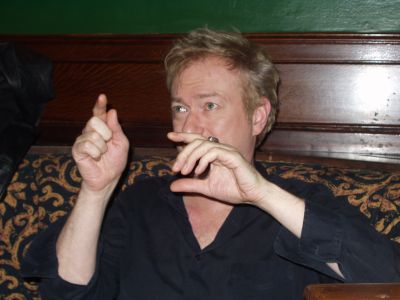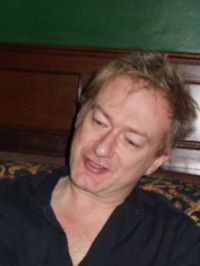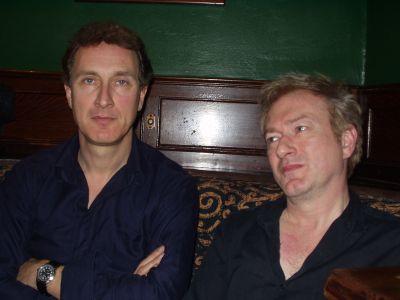INTERVIEWS
Jon King and Andy Gill see if the beer in the Fenton is as good as it used to be with Ross McGibbon
I should explain that The Gang Of Four had a powerful effect on me in the late 70s / early 80s and I still have an image of Andy Gill lodged in my brain, hurtling across the stage, flaying a guitar wildly. Combining strikingly new music, intense politics and a graphic sensibility borne of being art students, the band is claimed today more than ever as an influence by a whole new wave of bands. Twenty-five years since I last saw them, they are reforming for a short series of five dates and I'm really keyed up to hear what they have to say about that and about the band they used to be. We begin by discussing the 'big sell-out' when the Gang of Four surprised everyone by signing to EMI. Jon explained that people who run small labels love music and want a hand in its production whereas big labels like EMI are just interested in the bottom line and leave you to get on with it. Jon - Essentially we'd record a record, the A&R man would pop in once or twice, probably just tell you a couple of funny anecdotes, take you out for a few pints and you didn't see him again till you handed the record in. Andy - We also did rather an eccentric thing, in that we owned the record and we licensed it to EMI. Was that unusual for the time? It's more common now. Jon - Well no one had ever done that before. It was really to make it clear that we would make the record and give it to them and they would take what they got. They had no contractual right to say no to it. After that there were some acts, like Lou Reed, who delivered Metal Machine Music, which was just horrible guitar, to get the record company to drop him. The thing I found interesting is that they would do a double take with some of the things we did. I mean, the cover of Entertainment - when we handed that in (Andy and I did the artwork on that) they just didn't know what to do with it. They were quite speechless. Andy - Not having a picture of the band was pretty unusual. Jon King - We refused to have a picture of the band on it. How about the dressing up as Maoists? Jon - You adopt certain codes, codified emblems and ways of expressing yourself and you can either align yourself with one type of thing or not. Were you ever aligned with a political party? You were involved with Labour for a while. Jon - We were in the family group of Northern Rock Against Racism and we did lots of Rock Against Sexism. Andy - And the Corrie Bill, the march in London, the anti-abortion bill. It was very funny to play the Rezillos song 'Can't Stand My Baby'. I'm amazed no-one got that. Of course, the strapline every article got was 'rock's most famous Marxists'. Jon- I'm very proud of that. We came in as part of the left and I'm very proud to be part of that new left. When you look at the oppression of Eastern European governments and Maoist governments, we didn't support that. I did an interview in America and a reporter said to me 'how can you be a communist and make money from shows. I said 'well, first of all I'm not a communist but actually I think you've got your categories in a twist. Actually Marx would have said that money exchanges hands rightfully in a communist system. And the headline said 'Jon King denies he's a communist!' The reality is are you going to do something which is dangerous and reckless and challenging or not? And that was what drove us on, on that journey. Which means that all these years later people namecheck it because they recognise the danger and the recklessness of some of it.
Jon - It's funny. My son, who's fourteen had his mates round and they were playing the Red Hot Chilli Peppers last album (Andy produced part of their first). Obviously they were big fans back then and this last album is so like it and there was a song playing that had the exact structure of Return The Gift in it and I did a double take - did we do that? What people have come to now is to try and lose the camouflage. To Hell With Poverty has only three notes and not a single chord in it, a two note riff and a one note middle break. Where other songs have got no verse, no bridge, no chorus. They've got slabs of text over slabs of performance. We've been re-recording to get our old songs and it's been drawing us into this space that we were occupying mentally, about relentlessly pursuing these ideas. You listen to old blues records and there's a man or a woman with a guitar and there's nothing to hide behind. It's a take, it's a moment in time, it's an experience and with all these effects, foot pedals, double tracking and all the technology, someone could say 'where's the authenticity'? That's always a complicated word. It was on our list of banned words and we would argue about whether they were or weren't a good word to use." Andy - Dollar was banned, because we'd used it a couple of times, we thought unsuccessfully. It's a kind of cheap shot. Jon - It was a lazy image. Andy and Jon both dig into the Manic's Richard Nixon song. Jon - If you're going to have a go at someone in reactionary politics, have a go at someone who's alive and active. Jon excuses Richard Adam's opera Nixon In China though. Not your average rock singer reference..... Jon - You have to use images that are not lazy and you have to use words that are not complicated. We used to argue a lot about complicated words. At Home He's A Tourist - there's not a clever word in it. I used to try and try and write songs with no clever words, no rhymes, no choruses and Andy would write a guitar part with no key changes. Has anyone covered any Gang Of Four songs? Andy - Why cover the songs when you can make a career out of sounding like them? We talk about bands copping the style and agree that only Radio Four have copped the attitude as well. Jon - We use that word 'authenticity' and we could argue all day about it. In fact we would have sat in this pub and argued about authenticity. Andy - In the same seats. Jon - We'd have sat here for six hours arguing about it. I spent four and a half years sitting in this seat. I never ever went in that room, only this room. That idea that you say things that you mean, you don't try and please the powers that be, you're not there trying to mediate your ideas by thinking 'will someone else like it?' What is the point of challenging rock music anyway? I think we made dangerous music. Regrettably it didn't sell by the shipload. Someone asked me the other day - what was the most commercially successful record you made? And I said - that's a bit of a category error! I don't think we ever sold more than a quarter of a million albums. We get onto talking about Andy producing the Red Hot Chilli Peppers. Andy - It was a fractious record. They were out of it at the time on smack and speed. Flea would disappear for days at a time. Which was a relief, actually. And the mythical turd story? Andy - To cut a very long story as short as possible: Mixing the record. Me and the engineer are in there in Eldorado Studio in Hollywood. No band members there. It's mid-afternoon. In walk Flea and Anthony, sit down for a while and listen. Then Flea said 'we're going for a shit' and I said (and as I said it I knew I was being very foolish) 'oh, bring me one back'. Why did I say that? I knew what was coming, they don't have to be asked twice.... Jon - We went to LA to play a couple of shows at The Palace and this bloke jumped out of the audience with all his kit off, streaking, and grabbed me. Andy - That was Jon's first contact with Flea. Jon - A while back my son said 'the Chilli Peppers say you lot were great, don't they?' I said, 'yeah, sure, I've got a picture of me and Flea. Would you like to see it?' And there was Flea's arse. And my son said 'Dad, you're such a show-off'. How did the original musical direction of the Gang Of Four come about? Because it was unusual for the time. Jon - The project was about space. Andy - We approached it musically in the sense of not wanting to use any off the shelf ideas. It's that old Tin Pan Alley idea - that the only bit you put any effort and thought into is that different sequence of chords - getting that top line that's a bit clever or interesting or hooky and the supporting chords. In other words, the traditional song idea and it really doesn't matter what the bass and drums do - just tap along boys. Jon describes Carole King sitting at a piano on Tapestry with the other musicians following along. We talk about musical competence and live shows. I always had the impression that Andy was hitting the guitar then dragging the note to the one he wanted. He nods. Sometimes there couldn't have been that much chance of accuracy. I can remember seeing Andy winding himself up before launching himself across the stage at speed, banging the guitar and thinking 'there's not a lot of scope for you getting exactly the right note there, is there? But it'll be a good note.' Andy - I think the good thing about Gang Of Four stuff is it plays around with musicality. Sometimes it'll tread that fine line between musical and not. Jon - Between clever and stupid. Lots and lots of feedback. Jon - Is he in control of his instrument? Especially in the middle of a song. Jon - The way we approached it was top lines with no melody, songs with no key changes, orderly bits followed by chaotic bits. But it was musical because we would lock into sections of music. It was fucking tight. Musicality is an interesting thing and when I listen to bands that have taken an inspiration from the Gang Of Four, the first thing they inject is top line and melody. Like The Peppers. One of their devices is to do things that sound like it then bring in a kind of a kooky melodic chorus. There is an absence of melody in our stuff. One of the things that was very simple was to get a very repetitive and signature drum beat. We wanted the repetition and we wanted that to go through with a bass line that we wanted to be funky and actually danceable.
Jon - Fantastic. I loved those because we were very non-competitively competitive and we both wanted to be the most intense and we worked really hard. They were really good friends of ours at the time. He had his beer warmed up. He had a roadie that doubled as beer warmer. And he had the smelliest suit that ever was that I don't think he'd ever had cleaned. On stage I would watch him and he was wonderful. His great genius was using the microphone as a kind of peculiar prop. He didn't actually sing, he used to talk around the microphone. He would have conversations which he knew no one could hear. Andy - He'd walk away from the mike whilst a bit of music went on and he'd stand there, looking around a bit and then he'd look at his watch and go up to the mike again. Jon - I think that was one of my favourite tours. I think that that inspecting your shoes style of performing which is so dominant now and was dominant then - you're playing and people are supposed to admire your musicianship - well actually you're there to grab the audience and drag them into this thing and have a collective emotional experience. How long has it taken you to get it back together? Andy - Well we've been doing these recordings.... What are you going to do with these recordings? Jon - Well, nothing. Well it's got so impressive in itself, it's a peculiar project. Andy - People are doing mixes of different tracks. Massive Attack are doing a song, Hot Hot Heat are doing a song, more people are coming on board at the moment - Franz Ferdinand are doing a song. It's going to be two sets of fourteen songs. One's going to be straight mixes and one's going to be mucked around with by various, ahem, contemporary artistes. Can I ask the obvious question - how come you've got back together? Jon - I think that it's an adventure. Pension fund? Jon - If you know the secret of turning five dates into money... We talk about ticket prices and compare the £1.50 it used to cost in 1980 with the £20 it'll cost in Feb this year. For twenty quid I hope it'll be a two hour extended jam-fest! Jon - We're going to play Dark Star! Dark Star for an hour and twenty minutes! Jon and Andy - Do do dee do, do do dee do..... What happens if the dates go well - will there be any more? Jon - No. In all honesty, I think that we have all found that it was puzzling at first then quite interesting then quite fascinating how so many really good bands have taken an inspiration from what we do. Then there was the sense of trying to do something that's fun. It's all quite complicated and it's also expensive. Dave and Hugo have got to fly over from America and they've got to live in London for a month. What have you been doing? Jon - I run a big webcasting company. Andy works in producing and other projects. And as well as The Gang Of Four the two of them have worked on music for TV - the BBC, Parliament Today, Westminster Live. Would you ever make a new record? Jon - No. There's no new material come out of this time? Jon - The shows are going to be overwhelmingly from the first two albums. We play, I think, two songs - Uniform and We Live off the third album. And we might play a couple from Shrinkwrapped but nothing off Hard. Cover of Sweet Jane? (They played a cover back in 1979). Jon - We might even do a cover of Sweet Jane.... We did try to do a cover of Purple Haze once. Andy - Awful, awful! Jon - That was really, really bad. Do you find that you fall back into old patterns? Jon - It's a bit like going home for Christmas. People tend to reinvent themselves to the point at which they last were there. Have your politics mellowed? Jon - I think they dipped a bit but I've just realised to my great pain that I've become really angry again. I've gone from being a grumpy young man to a grumpy old bastard. The other famous Leeds Marxist is Jack Straw and look how he turned out. (cue mass sucking of teeth). Jon - He's got more extreme with age. The only party I ever joined was the Labour Party. I'm not a member now but I was for a long time and I think, in 1992, if you wanted to make the world a better place you had to get the Conservatives out. Andy - It's a much less polarised society now. If you think to when Thatcher was in power it was impossible not to have a point of view. Some of your songs, with the benefit of hindsight, sound prophetic. Jon - 'There may be oil under Rockall'. They have actually found oil under Rockall. Guerilla War Struggle. The corpse is a new personality. Andy - Well that is literally true now. Al Jazeera..... Jon -Then you've got commodification. Before you take a step you create a barrier, a little prison for your own imagination and that's what bands do. So; the Gang Of Four - A product? A package? The recycling of rock? They're playing five dates at the end of Jan 2005 if you want to make your mind up.
|




